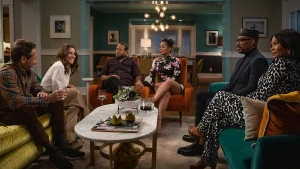Halloween Flicks Pt. 2
Four more classic horror films that are entertaining even if occasionally absurd.


There’s a lot that can be said of You People, a recent comedy film released through Netflix starring Jonah Hill, Lauren London, Eddie Murphy and Julia Louis-Dreyfus. It covers the somewhat cinematically underdeveloped and occasionally controversial subject of interracial and interfaith marriage and the ensuing clashes between older and younger generations on the matter. The film bravely, in my opinion, addresses a generalized ignorance both Black and white people possess in their dealings with each other. You People puts words to things that we’ve all thought about from time to time but never had the courage or willingness to admit to. And leave it to the comedy genre, and producer, writer, and star Jonah Hill, to cover the topic with enough humor and candidness to not alienate its audience. Instead, the film attempts to invite the audience into a much needed discussion.
Praise and critical accolades, however, are not the things that seem to be following You People since its release. Despite debuting at number one on Netflix, the film’s success has been somewhat overshadowed by a recent article that claimed the two main characters, Ezra and Amira, never actually kissed in the film’s closing scene. Co-star Bill Schultz recently commented on his podcast that on set the two actors paused before their lips locked and that one of the film’s most intimate moments was actually created by CGI.

What’s the point of this strange yet fascinating bit of news? For me, the article implies there’s a certain fraudulence to the movie. How can you portray a love story between two people and not have them actually kiss? If a romantic comedy is a cookbook, the kiss is an essential ingredient. The authenticity and message of the film are called into question.
This might be an overblown reaction, however. This “news” arguably does not mean anything and may not even be true. And if it were true then so what? Maybe the production saved money by not hiring an intimacy coordinator. Or perhaps the writers decided that scenes of an intimate nature were unnecessary, that the story was less about expressions of love and more about interracial couples and their dealings with societal and familial expectations.
The aforementioned familial expectations take the form of two sets of parents. Arnold and Shelley, played by David Duchovny and Julia Louis-Dreyfus. The other parents are Akbar and Fatima, played by Eddie Murphy and Nia Long. Jonah Hill plays Ezra, a young, Jewish, up-and-coming podcaster who meets Amira (Lauren London), a fashion designer, after inadvertently getting into the back seat of her car, mistaking her for an Uber driver. The movie then jumps ahead a few months to find them living together as a couple. Deciding that they want to take their relationship to the next level, they realize they must first introduce themselves to each other’s respective parents.

From the get-go, it’s a mess. Shelley says many inadvertently offensive things in their first encounter. While Akbar is immediately turned off by Ezra simply for being white. Most of the film is spent with Akbar finding all the ways in which Ezra is an unfit suitor for his daughter. Something he would do with any partner of his daughter’s, but with Ezra, he’s especially critical.
This all builds up to a wedding scene where many grievances are aired. While there is some very funny dialogue in the movie and a few awkward exchanges you can only laugh at, it’s during the wedding when I felt like bottled-up conversations were finally had. They were more like lectures from the two leads, but nevertheless, their arguments were impassioned and clear.
I’d like to praise Jonah Hill. For better or worse, he is the romantic lead in this film. And he carries it with confidence and a kind of suave nature that surprised and impressed me. Also, the bleached blonde, combed-back hair look makes a brash statement that adds to his role in the movie. Additionally, Eddie Murphy is great in this film. He’s calm, and funny at times, but his stern dad is relatable even when his character does things that are unlikeable.

Julia Louis-Dreyfus plays a rich, ignorant, West Coast suburban mom very well. And Lauren London’s Amira is down-to-earth, funny, and true to herself.
You People was directed by Kenya Barris, creator of black-ish. According to IMDB, it is his first feature film. It’s quite a feat for a first film. The topic of interracial marriage has been frustrating audiences since Guess Who’s Coming to Dinner back in 1967. This film improves on that ancient one and is also more mature and much more fairly represented.
Additionally, You People is impressive because it does things that are simply not easy to do in movie-making with regard to casting and tone. While the film’s message may be dated for some, and some of the exchanges may feel corny, You People still tackles biases and marital/familial issues rarely addressed in mainstream, commercial films.
A few issues I had with the film. It’s about 20 minutes too long. The title, a racist term traditionally used to refer to African-Americans en masse, misrepresents what’s being portrayed at times. David Duchovny is criminally under-used. And some of Ezra’s phrases made me kind of cringe a little bit. Some of the language/phrasing originated by Black people (and at times appropriately reserved for Black people) made me a little uncomfortable coming from white characters. That’s just my opinion.
The film is a thumbs-up for me. It centers not only on race, but religion, generational divides, and what it’s like being a millennial during these turbulent times. It says something that a film largely panned by audiences is also one of the most widely viewed. These topics, while difficult to discuss and often unsuccessful in their attempts, can also be those most essential.
Related lists created by the same author
Four more classic horror films that are entertaining even if occasionally absurd.
Related diversity category
We are constantly being pushed to move on from mishaps and negative feelings. What happens if we're not ready to do so?
Related Movie / TV / List / Topic
Vicenza, a Brazilian girl, goes on a quest by herself to find out who her birth father is by gathering clues.